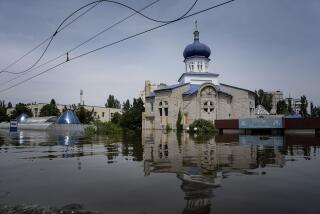Mideast Heads for Wars Over Water : Rapidly Diminishing Supplies Aggravate Historical Enmities
- Share via
Water, not oil, will be the dominant resource issue of the Middle East as the region confronts rapidly diminishing supplies. The implications for a new dimension to regional conflict are frightening.
According to Worldwatch Institute, “despite modern technology and feats of engineering, a secure water future for much of the world remains elusive.” Nowhere is this prognosis more true than in the Near East--Jordan, Israel, Syria, Egypt and the West Bank--where emerging water shortages are creating a situation of crisis proportions.
By the year 2000 water consumption in Israel, Jordan and the West Bank will increase by 30%. Yet Israel alone is currently using 95% of all renewable water resources and consumes five times more water per capita than its neighbors. Further, the Jordan River has been so highly developed in recent years that it is now a limited resource. World Bank officials predict that Jordan, Israel and the West Bank will deplete all renewable sources by 1995 unless remedial measures are taken quickly.
In Syria overly ambitious agricultural development plans and the mismanagement of water-related infrastructures are already creating shortages of water and the rationing of electricity in major cities. Egypt’s burgeoning population (which is expected to increase by 15 million to almost 70 million in the next 12 to 15 years) will place critical strains on the Nile by the year 2000.
Many irrigation schemes in the region are so poorly designed and maintained that rising salinity levels in the soil are forcing the abandonment of valuable farmland. And throughout the area underground water supplies are being contaminated by inadequate and poorly managed sewage facilities.
There are growing fears in the diplomatic community that these problems could lead to heightened conflict and, conceivably, even to war: between Israel and Syria, Syria and Iraq, Egypt and Ethiopia --the list goes on.
Most tension stems from the distribution of surface water and the crucial need for riparian states to agree on allocations. Egypt and the Sudan reached their first extensive Nile water agreement in 1929, and they have since successfully coordinated a wide range of projects. Egypt worries, however, that Marxist Ethiopia, which contributes about 80% of the Nile’s water, could severely limit or disrupt the supply.
Iraq has long feared the effect of Syrian development schemes on the Euphrates. Now it is concerned that development schemes in Turkey (including the massive Ataturk Dam) could reduce the annual flow of the Euphrates into Iraq by more than 50%.
In past decades Israel, Syria and Jordan have fought over the Jordan River and its headwaters and tributaries. Lately, tensions have been mounting again.
Israel draws a major portion of its water supply from the West Bank. Two aquifers within Israel’s pre-1967 borders have already been fully exploited, while a third, in the West Bank, is approaching maximum utilization. The Israelis complain that inefficient irrigation methods used by the West Bank Palestinians waste precious supplies. Israel also contends that, while it must rely solely on its own sources of water, West Bank Palestinians could look to Jordan for assistance. Yet to draw on the Jordan or the Yarmouk River would threaten the strategic concerns of Syria and Jordan.
The Palestinians, for their part, cite the constant refusal of their requests to dig wells, complain that Israeli settlements receive the greater share of existing water resources and contend that they are denied access to groundwater--actions that force them to depend instead on unreliable rainfall.
The emerging water crisis and its effect on the region’s stability, and ultimately on strategic oil supplies, represents a serious foreign-policy challenge for the United States. Unfortunately, no simple solutions exist. Questions of water management touch on issues of economic growth, social development, intra-regional relations and national pride. Policy-makers are thus confronted with a modern-day Hydra.
Still, the United States can take steps that would help in dealing with parts of these problems. Efforts at data collection must be improved so that leaders have timely and accurate information when devising development strategies. Training programs for water technicians and engineers should also be accelerated. Finally, renewed research and development efforts could produce new water technologies that would help stretch existing supplies and even create new ones.
For a country accustomed to high-level “shuttle diplomacy” and comprehensive peace plans, data collection and training programs might appear mundane. But if our goal is to prevent yet another regional crisis, a comparatively small investment could have large returns. It may not be sexy, but it’s a start.
More to Read
Sign up for Essential California
The most important California stories and recommendations in your inbox every morning.
You may occasionally receive promotional content from the Los Angeles Times.










